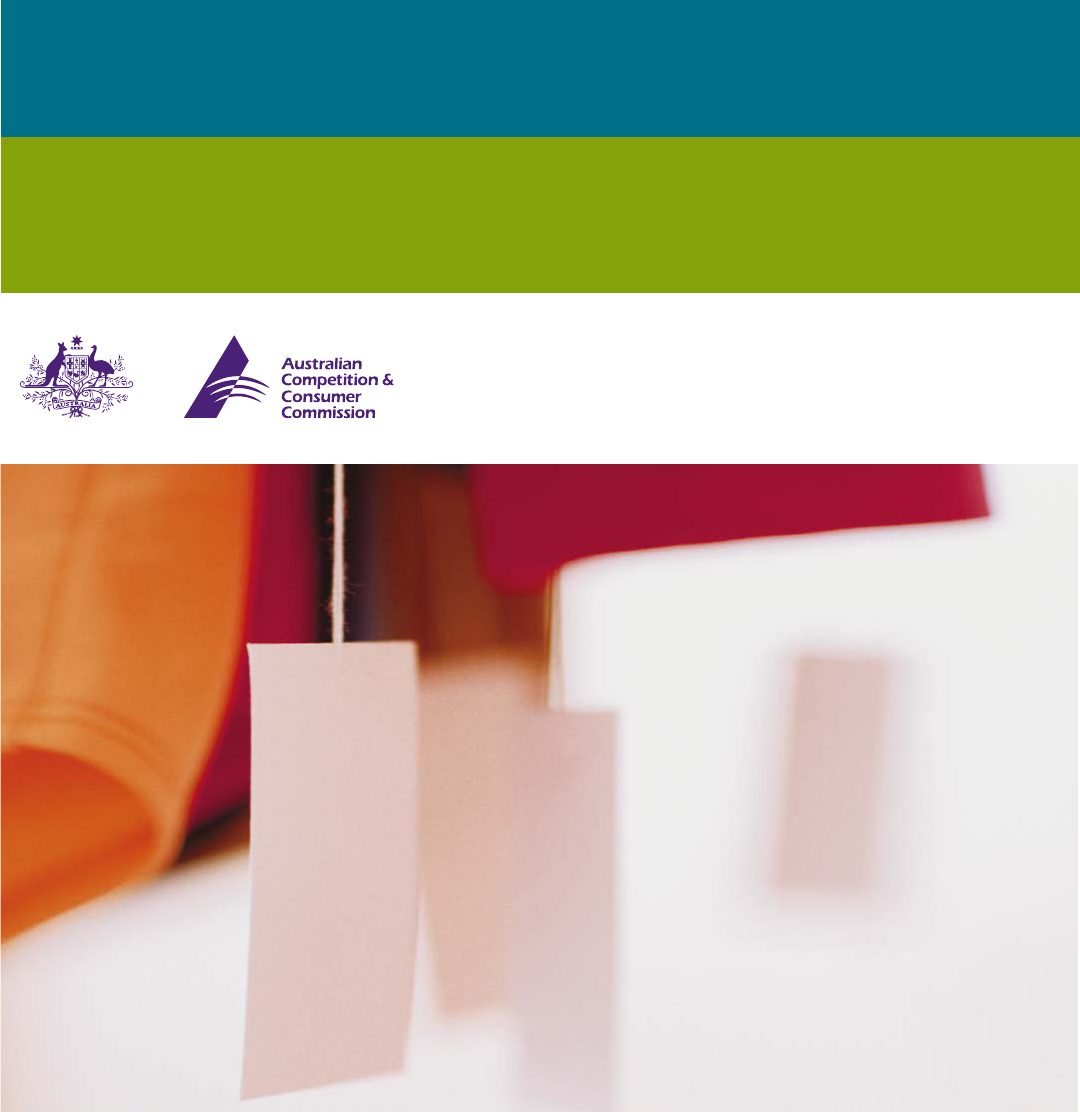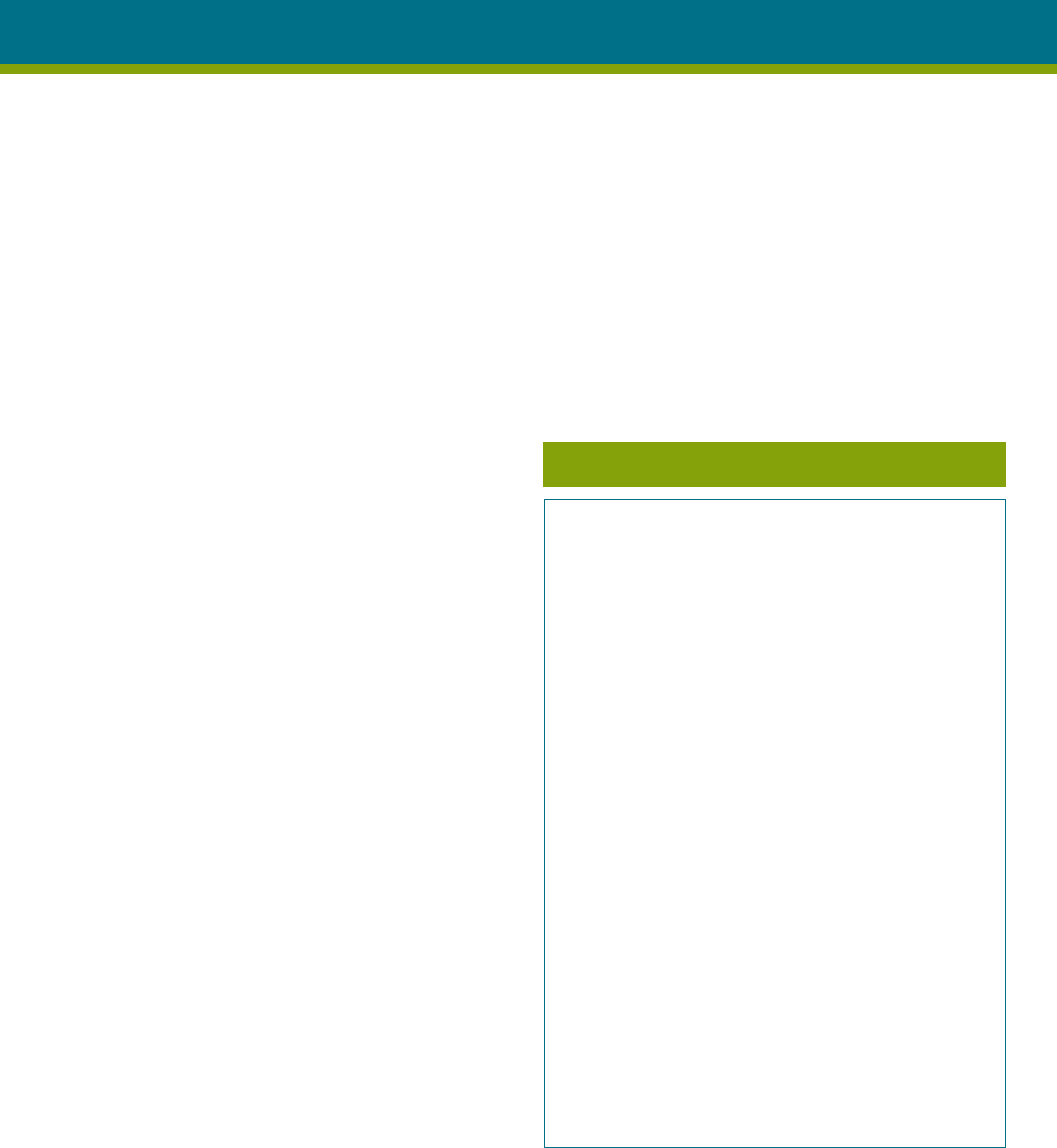
Business snapshot
Compliance is not just about obeying the
law, it makes good business sense
Businesses that accommodate the special needs of
consumers get a good reputation in all areas of their
business. Businesses that take advantage of vulnerable or
disadvantaged consumers get a bad reputation, not just
with the consumer involved, but with their family, friends,
carers and the broader community.
This guide will help you recognise when you are dealing with
disadvantaged or vulnerable consumers and the factors you
may need to consider in these situations, including relevant
court decisions.
Businesses are encouraged to deal with all consumers.
However, if it is apparent that a potential customer may not
have the capacity to make a voluntary or informed decision
about the implications and/or benefits of their purchasing
or contractual decisions, then businesses need to act
responsibly and take extra care in their dealings to ensure
that no unfair advantage is taken.
This guide outlines your rights and responsibilities in dealing
with disadvantaged or vulnerable consumers.
don’t take advantage of disadvantage
A compliance guide for businesses dealing with disadvantaged
or vulnerable consumers

Business snapshot—don’t take advantage of disadvantage
What do we mean by ‘disadvantaged’ or ‘vulnerable’?
Some consumers may be disadvantaged or vulnerable in
some marketplace situations if they:
• have a low income
• are from a non-English speaking background
• have a disability—intellectual, psychiatric, physical,
sensory, neurological or a learning disability
• have a serious or chronic illness
• have poor reading, writing and numerical skills
• are homeless
• are very young
• are old
• come from a remote area
• have an Indigenous background.
Of course, not all consumers with these characteristics are
more at risk of making poor business decisions. But be
aware that your marketing message and conduct may affect
some consumers differently when making decisions about
buying goods or services.
Your business should consider that consumers:
• whose English language skills are not good, or who
are visually impaired may not be able to compare
written contracts with your advertisements or verbal
representations—they are at risk if representations
abouttheterms of the contract are unclear, incorrect or
failto mention key terms
• in Indigenous communities may have had limited
exposure to commercial transactions and have little
understanding ofcommercial documents
• on low incomes may be more inclined to pursue claims
about low prices, but they may also suffer greater
financial impact if the claims are unclear, incorrect
orsimply untrue
• who live in remote areas may have limited choices, and
may therefore feel pressured to accept unfair terms
• particularly those from non-English speaking or
Indigenous backgrounds, may view transactions
according to cultural values rather than market values.
Why does my business need to be aware of
theseissues?
If your business deals with consumers it is likely that some of
these consumers will have one or more of the characteristics
of disadvantage or vulnerability listed above. You may even
deal in products or services which are specifically designed
for or target such consumers. It is therefore important for
your business to be aware of these issues.
Research has shown that most dissatisfied consumers do
not complain to a business until things get really bad. Even
then, around a quarter of consumers will not complain to
a business when things go really wrong. However,this
does not mean that they remain silent. The research also
estimated that a person with a complaint will tell an average
of nine other people (friends, family and workmates)
about the poor service they received and name the
company involved. When a business’ conduct is harmful
to disadvantaged or vulnerable consumers, damage to the
reputation of a business is probably even more likely.
Businesses generally have more information about the
goods or services they sell and/or more bargaining power
than their consumers. This imbalance may be greater for
disadvantaged or vulnerable consumers than for other
consumers. Disadvantaged or vulnerable consumers may
also have less understanding of the consequences of a
particular action or transaction or may believe that the
traderis acting in their best interests in situations where
theyare not.
All consumers need sufficient and accurate information to
make an informed decision. Special care may be needed
when dealing with disadvantaged or vulnerable consumers.
Be aware that you and your staff or agents are responsible
for ensuring that consumers have that information.
Tips for business
Preparing your business:
• Are your staff aware of fair trading, anti-discrimination
and other relevant laws? Have they received relevant
training?
• Be alert to any special needs your consumers have
andmake sure you have systems in place to prevent any
unfair treatment.
• Is your marketing message clear and accurate? Keep
in mind the different needs of current and potential
consumers.
• Are all documents you use to market goods or services
to consumers clear and simple?
During a transaction:
• Have you clearly disclosed important or unusual terms or
conditions of the agreement?
• Does the consumer understand the terms of any
agreement associated with the transaction? Has the
consumer had an opportunity to consider the offer
properly?
• Make sure the consumer is not flustered, agitated or in
a highly emotional state when they enter into a contract.
Observe any cooling-off periods that may apply or
consider offering a cooling-off period in writing.
• Consider that it may be appropriate for a guardian, carer
or other appropriate person to be present to either act on
the consumer’s behalf and/or help explain and assist the
consumer with the decision.
• If you are in any doubt, give the consumer an opportunity
to seek advice about the contract before they sign it.
• Make sure your actions, whether intentional or not, do
not take advantage of any characteristic listed under
theheading.

Business snapshot—don’t take advantage of disadvantage
After a transaction:
• If things go wrong, be open to resolving complaints and,
where appropriate, setting aside contracts or agreements.
• Do not reward your staff or agents for unfair,
pressure-based selling.
What does the ACL say?
Many of the fair trading provisions in the ACL
(includingthose discussed below) take into account
the circumstances, including the characteristics, of
thepeopleaffected.
Misleading or deceptive conduct
The ACL prohibits misleading or deceptive conduct
whichcan include:
• leading someone to a wrong conclusion
• creating a false impression
• leaving out or hiding important information
• making false claims about products or services.
This applies to all interactions with the public—from
the overall impression you create in your advertising to
one-on-one sales situations.
Unconscionable conduct
Unconscionable conduct is difficult to define or describe
as it varies on a case-by-case basis. It requires something
substantially more than just being ‘unfair’ or hard commercial
bargaining. As a general rule, it is conduct that is against
conscience as judged against the norms of society.
Disadvantaged or vulnerable consumers may be especially
vulnerable to unfair business conduct. Make sure consumers
understand everything you say. If you are unsure, give them
the opportunity to think about it or talk it over with someone
else.
The ACL sets out a number of factors the courts may
consider in deciding whether conduct was unconscionable,
including:
• the relative bargaining strength of the parties
• whether any unreasonable (including unnecessary)
conditions were imposed on the consumer
• whether the consumer was able to understand the
documentation used
• the use of any undue influence or pressure tactics
• the terms on which the consumer could have bought
the same or equivalent goods or services from another
business (including the price).
The courts may also consider any other factors that are
relevant in the circumstances, including whether the
consumer possesses any ‘special disadvantage’. In the
unwritten law (also known as Common Law), ‘special
disadvantage’ means that the consumer has a condition
or is in a circumstance that seriously affects their ability to
judge what is in their best interests.
Factors that may give rise to a special disadvantage
include an ignorance of important facts known to the staff
or agent of the business, illiteracy or lack of education,
poverty or need of any kind, the consumer’s age, infirmity
of body or mind, drunkenness, or lack of explanation and
assistance where necessary. Many of these factors match
the categories of disadvantage or vulnerability that the
ACCChas identified.
ACCC v Craftmatic Pty Ltd
The ACCC instituted proceedings against Craftmatic Pty
Ltd alleging that Craftmatic had acted unconscionably
against senior citizens in the door-to-door sale of beds by
taking advantage of the commercial inexperience of elderly
and housebound consumers through high pressure sales
tactics.
Between August 2005 and at least 1 June 2008,
Craftmatic used misleading and unfair tactics to convince
elderly people to agree to a home presentation by one of
Craftmatic’s sales representatives. Once at the consumer’s
home, an elaborate and well rehearsed sales process was
used to persuade the consumer to buy a Craftmatic bed,
in some cases costing more than $10 000.
While some consumers were happy to buy a bed, others
who indicated that they either didn’t want, or could not
afford, to buy a bed were subjected to a barrage of unfair
sales techniques to change their mind.
The Federal Court of Australia declared, by consent, that
Craftmatic’s method of promotion and sale consisted
of steps designed, scripted and conducted to unduly
influence potential customers and to create and take
advantage of an unequal bargaining position.
The Federal Court ordered injunctions for a period of
seven years restraining Craftmatic from a wide range
of conduct that was found to be misleading and
unconscionable, in breach of the Trade Practices Act
(renamed Competition andConsumer Act 2010 on
1January 2011).

ACCC v NuEra Health Pty Ltd
The ACCC alleged that NuEra Health Pty Ltd and the
family members who operated NuEra Health engaged in
unconscionable conduct in the marketing of the ‘RANA
System’ to highly vulnerable consumers when signing
them up to pay for alternative cancer treatments.
The RANA System was described as ‘an alternative
approach to cancer care which offers HOPE to cancer
sufferers’. The System included a variety of products
and services including, vitamin and mineral supplements,
Cesium or high PH therapy, Zen Chi Massages Magnetic
Pulsers, coffee enemas, ozone therapy, diets described
as eating according to blood type, live blood analysis and
thermal imaging, which cost up to $35 000.
In marketing the RANA System, NuEra falsely claimed
thatit:
• could cure cancer, or reverse, stop or slow its progress
or would prolong the life of a person suffering cancer
• was based on generally accepted science, when this
wasnot correct.
The Federal Court of Australia described the conduct of
NuEra as ‘unconscionable in the full sense meant under
the Trade Practices Act’ (renamed the Competition and
Consumer Act on 1 January 2011) and ‘of the most
reprehensible kind, revealing a cynical and heartless
exploitation’.
The NuEra companies, and the family members who ran
NuEra were permanently restrained by the court from
engaging in any of the offending conduct.
ACCC v Ramon Lal Keshow
The ACCC brought an action alleging unconscionable
conduct against Mr Keshow who was marketing
educational materials to Indigenous people in the Northern
Territory. The ACCC identified eight Indigenous women
who had signed forms allowing automatic deductions
from their bank accounts into accounts controlled
by MrKeshow as payment for educational materials.
JusticeMansfield found that for a significant proportion of
Mr Keshow’s customers, the goods were not supplied and
excessive payments were deducted from the customers’
accounts.
The court not only found that Mr Keshow was
unconscionable in his dealings with the particular
consumers, but also found him to have acted
unconscionably in relation to Indigenous consumers in
the Northern Territory generally—based on his ‘way of
operating’.
This general unconscionable course of conduct did not
depend on the particular interactions or transactions of the
witnesses produced by the ACCC. Mr Keshow’s ‘way of
operating’ included:
• not offering the consumers a written record of the
contracts they entered into, which involved automatic
bank account deductions as well as other conditions
that the Federal Court found were not reasonably
necessary to protect Mr Keshow’s legitimate business
interests
• being aware of his consumers’ relative poverty, cultural
differences and lack of experience in commercial
matters but not notifying consumers of the excessive
payments, not holding the excessive payments on
behalf of the consumers and not advising consumers
how to stop theautomatic payments.
The Federal Court banned Mr Keshow from entering
Indigenous communities to conduct his business, and also
placed restrictions on his receipt of automatic payments
for goods or services.

Harassment or coercion
While a business has the right to market its goods or
services and reasonably pursue a debt owed to it, when a
sustained marketing or debt collection effort is unwarranted,
unreasonable, excessive or too intense, it can constitute
‘undue harassment’ or ‘coercion’ and breach the ACL.
A person is ‘coerced’ when they are made to do or not
do something (for example, buy a product or obtain legal
advice) by force or threat of force or other intimidation.
Actions that may be reasonable for most consumers
may distress or intimidate disadvantaged or vulnerable
consumers.
Collection House Limited v Taylor
An unemployed mother of a deaf dependent child was
cold-called by a Collection House Limited collector
who questioned her about her personal and financial
circumstances. The collector implied that legal
proceedings may be instituted if no payment was made
on a debt of $10 000 that, unknown to the debtor, was
statute-barred.
The court found the collector’s conduct to be
unconscionable and noted that the circumstances were
sufficient to require the collector to establish that the
transaction was fair, just and reasonable—which the
collector did not do.
Be fair and be aware—the role of the Australian
HumanRights Commission
You also need to be aware of your obligations under anti-
discrimination legislation. In some cases, discriminating
against consumers who experience vulnerability or
disadvantage may break the law.
This could include refusing to deal with these consumers or
treating them less favourably than other consumers. Contact
the Human Rights Commission or the state or territory
equivalent for more information.
The Human Rights Commission can help you with any
questions in relation to anti-discrimination laws.
Telephone: (02) 9284 9600
Complaints Infoline: 1300 656 419
Privacy Hotline: 1300 363 992
General inquiries and publications: 1300 369 711
TTY: 1800 620 241
Facsimile: (02) 9284 9611
Website: www.humanrights.gov.au
Email: [email protected].au to request
information on lodging or responding to a complaint. Please
note that this email address is an information service only.
You can lodge a complaint online from the Human Rights
Commission website.
Where can I get more information?
For more information on the Competition and Consumer
Act, visit the ACCC website www.accc.gov.au or call the
ACCC’s Small Business Helpline on 1300 302 021.
You can also visit www.consumerlaw.gov.au for an overview
of the Australian Consumer Law—the new consumer law
regime operating across Australia.
For other business information go to www.business.gov.au

ACCC contacts
Infocentre 1300 302 502
Website www.accc.gov.au
For information in languages other than English,
call 131450 and ask for 1300302502
TTY service for people with hearing or speech difculties:
1300303 609 www.accc.gov.au
© Commonwealth of Australia 2011
Important notice
This publication has been updated to refer to the Competition and
Consumer Act 2010 which replaces the Trade Practices Act 1974 on
1January 2011. For more information on the Australian Consumer Law
changes see www.consumerlaw.gov.au
The information in this publication is for general guidance only. It does
not constitute legal or other professional advice, and should not be relied
on as a statement of the law in any jurisdiction. Because it is intended
only as a general guide, it may contain generalisations. You should obtain
professional advice if you have any specific concern.
The ACCC has made every reasonable effort to provide current and
accurate information, but it does not make any guarantees regarding the
accuracy, currency or completeness of that information.
ISBN 978 1 921887 51 2
ACCC 11/14_44164_217
ACCC addresses
National office
23 Marcus Clarke Street
Canberra ACT 2601
GPO Box 3131
Canberra ACT 2601
Tel: 02 6243 1111
Fax: 02 6243 1199
New South Wales
Level 20,
175 Pitt Street
Sydney NSW 2001
GPO Box 3648
Sydney NSW 2001
Tel: 02 9230 9133
Fax: 02 9223 1092
Victoria
Level 35,
The Tower
360 Elizabeth Street
Melbourne Central
Melbourne Vic 3000
GPO Box 520
Melbourne Vic 3001
Tel: 03 9290 1800
Fax: 03 9663 3699
Queensland
Brisbane
Level 24,
400 George Street
Brisbane Qld 4000
PO Box 12241
George Street Post Shop
Brisbane Qld 4003
Tel: 07 3835 4666
Fax: 07 3835 4653
Townsville
Level 6,
Central Plaza
370 Flinders Mall
Townsville Qld 4810
PO Box 2016
Townsville Qld 4810
Tel: 07 4729 2666
Fax: 07 4721 1538
South Australia
Level 2,
ANZ House
19 Grenfell Street
Adelaide SA 5000
GPO Box 922
Adelaide SA 5001
Tel: 08 8213 3444
Fax: 08 8410 4155
Western Australia
3rd floor,
East Point Plaza
233 Adelaide Terrace
Perth WA 6000
PO Box 6381
East Perth WA 6892
Tel: 08 9325 0600
Fax: 08 9325 5976
Northern Territory
Level 8,
National Mutual Centre
9 –11 Cavenagh Street
Darwin NT 0800
GPO Box 3056
Darwin NT 0801
Tel: 08 8946 9666
Fax: 08 8946 9600
Tasmania
3rd floor,
AMP Building
86 Collins Street
Hobart Tas 7000
GPO Box 1210
Hobart Tas 7001
Tel: 03 6215 9333
Fax: 03 6234 7796
